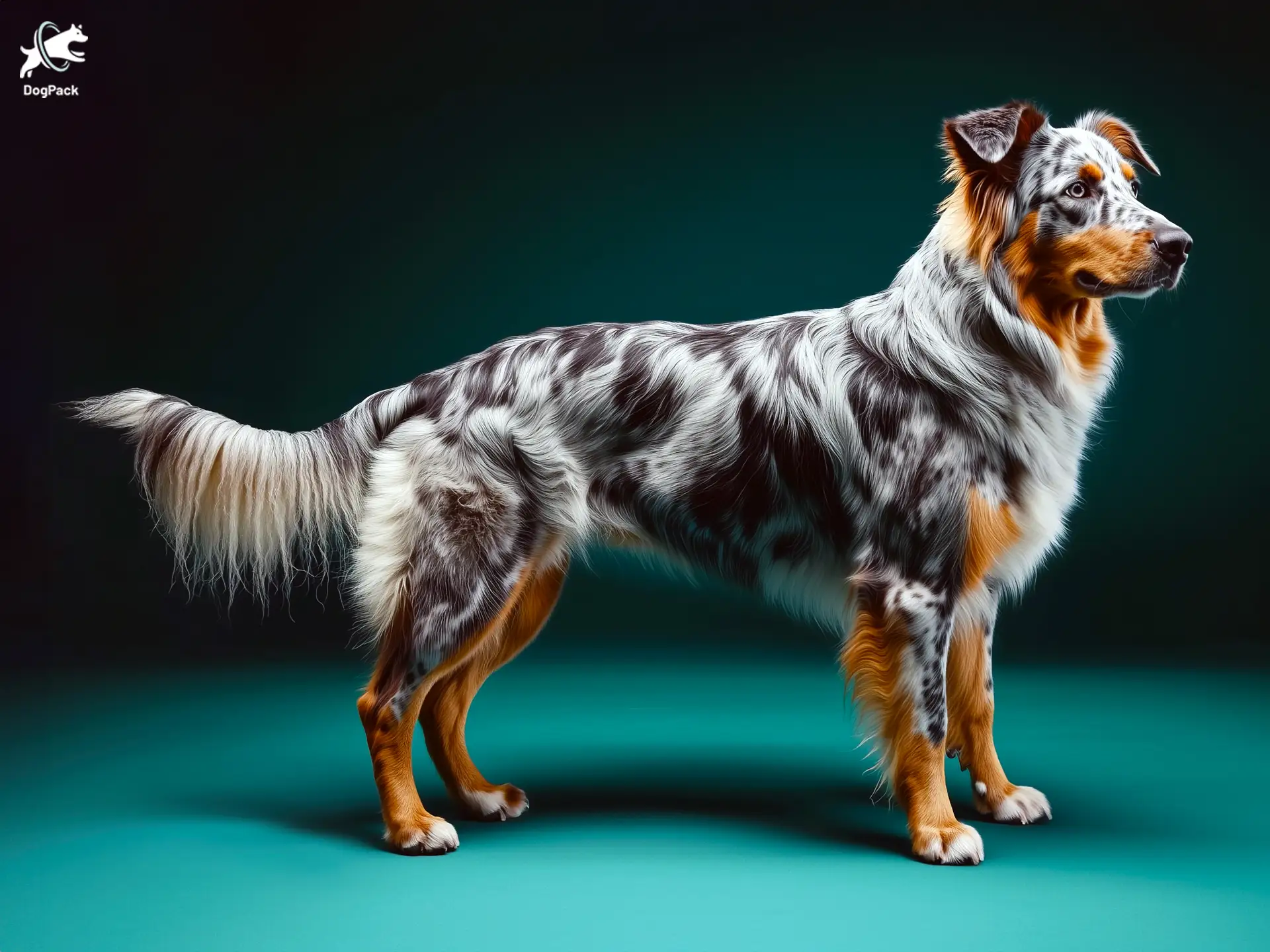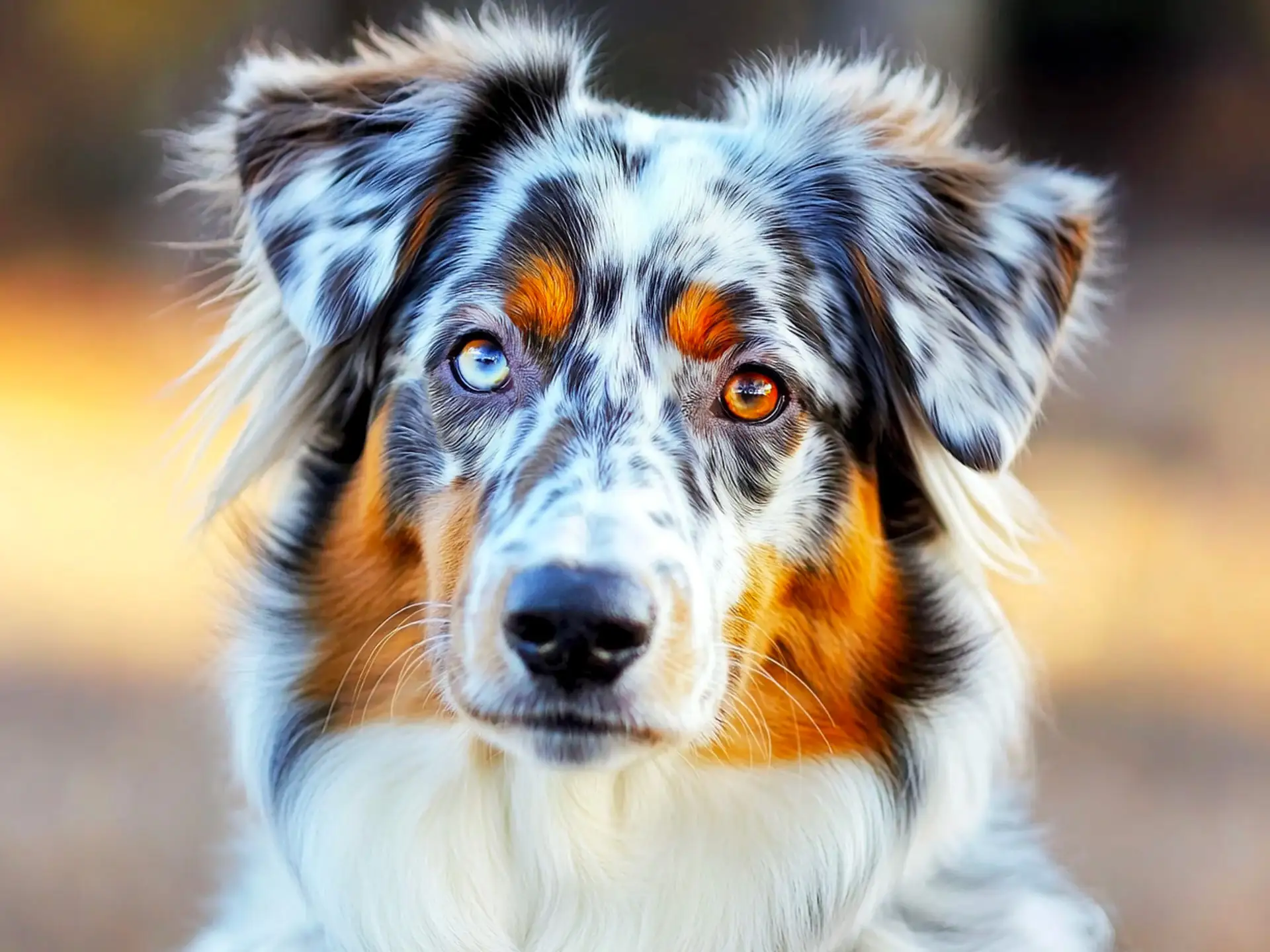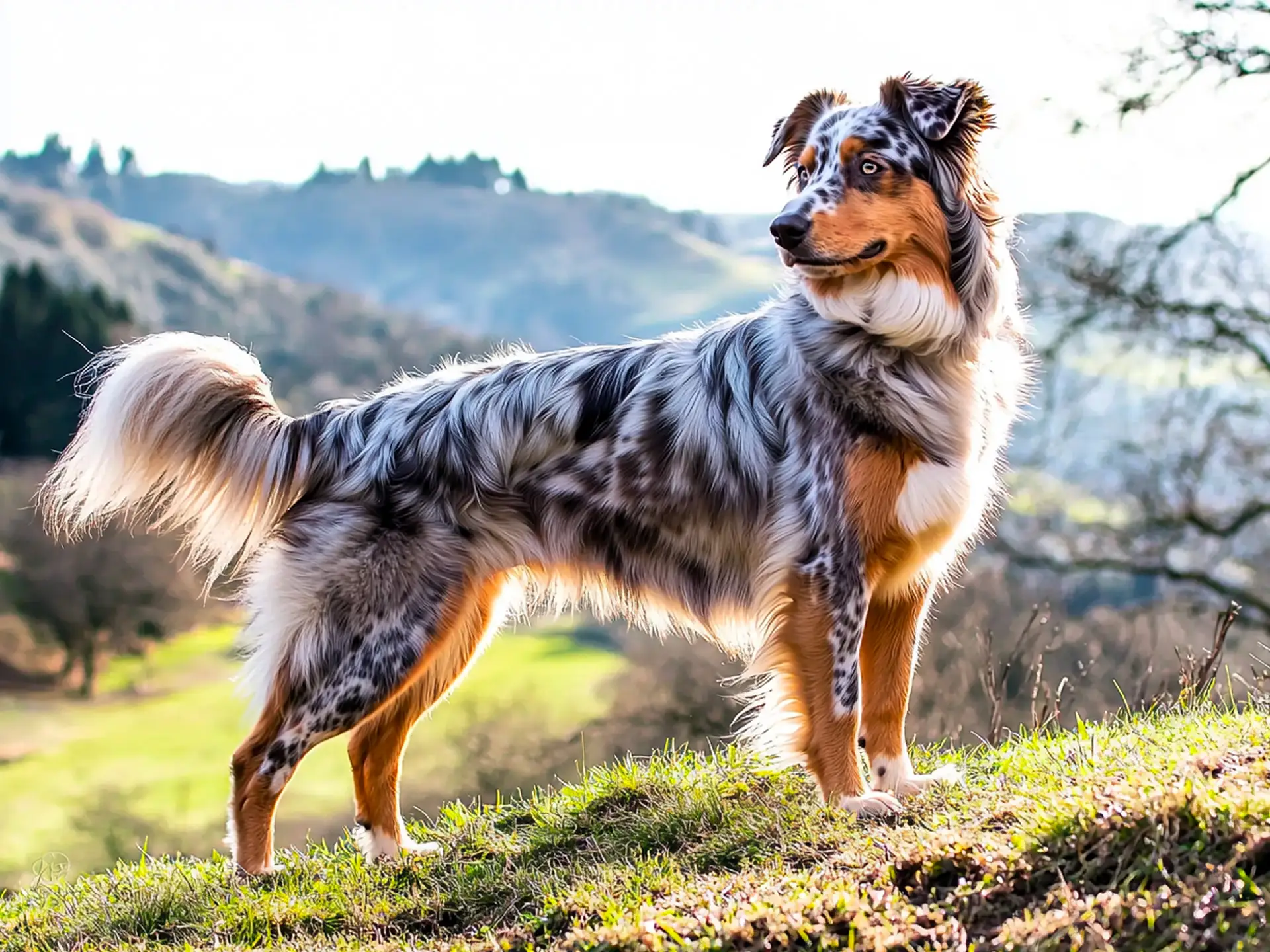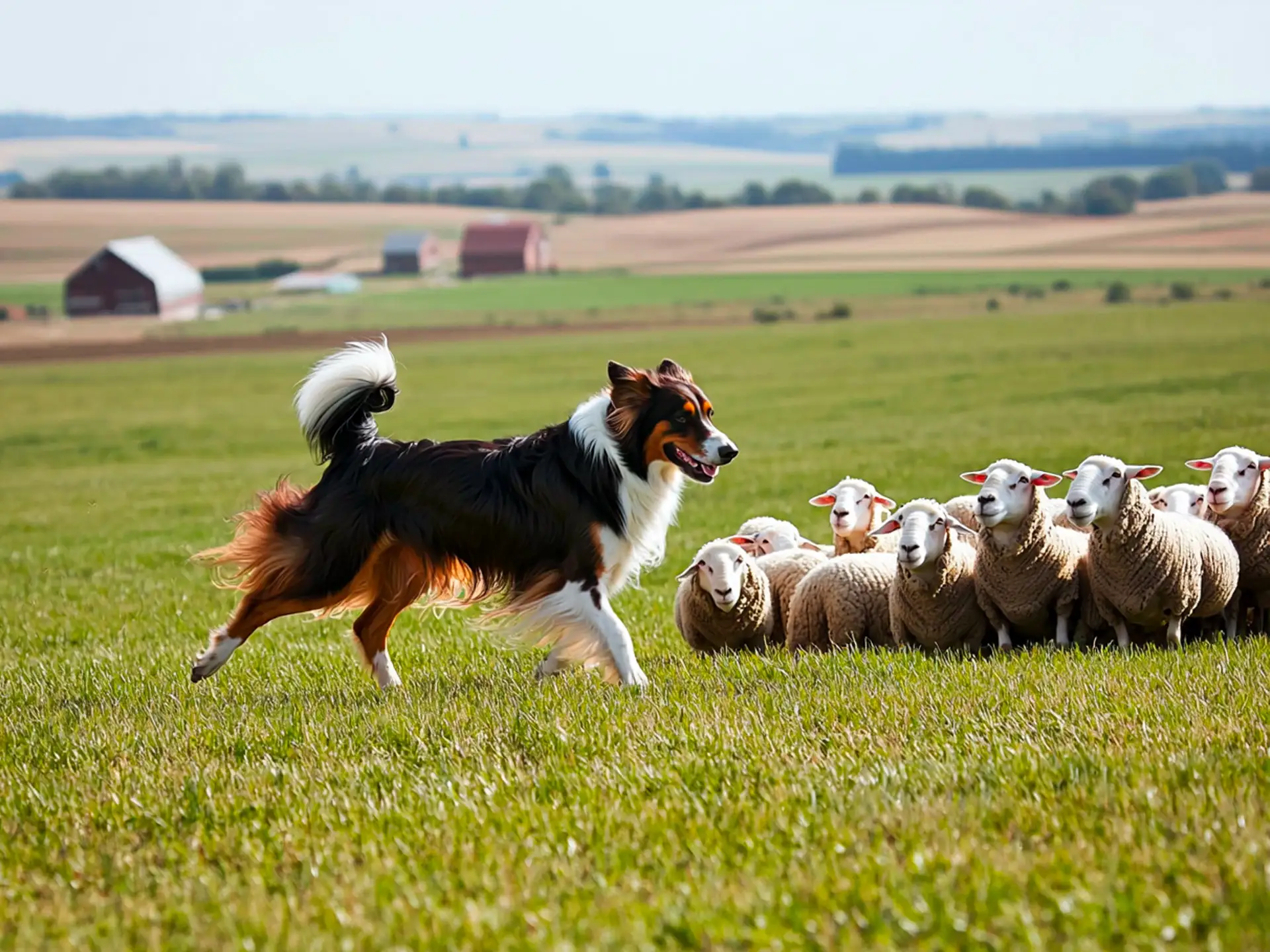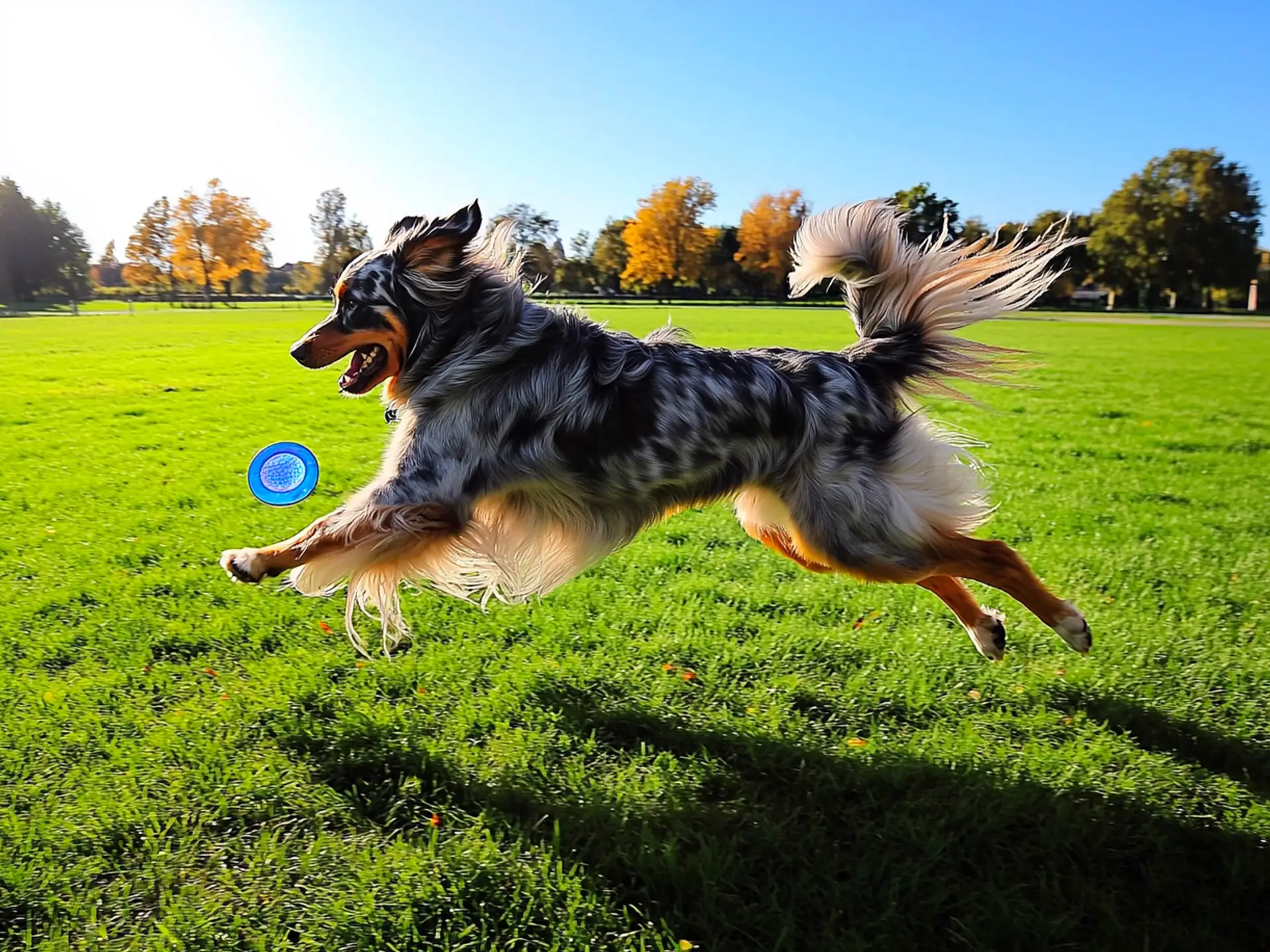Australian Shepherd Dog Breed Info & Overview
The Australian Shepherd is a bundle of energy and devotion, perfect for those who love an active lifestyle. Despite their name, these intelligent herding dogs originated in the U.S., where their agility and sharp instincts quickly made them favorites on ranches and farms. Whether as working dogs or loyal companions, Australian Shepherds bring boundless enthusiasm and love to every adventure, making them ideal for active families and individuals alike.
Characteristics
Pictures
Breed History
Contrary to what their name suggests, Australian Shepherds actually originated in the United States during the 19th century. They were bred to herd livestock, particularly sheep, in the Western U.S. ranches. The breed’s ancestors likely include Collies and other shepherd-type dogs imported with shipments of sheep from Australia, which is where they got their misleading name. If you’re interested in other herding breeds, check out our Shepherd Dog Breeds page.
The breed gained popularity due to their incredible work ethic and versatility on ranches and farms. Australian Shepherds were prized for their ability to handle the rugged terrain and varying climates of the American West. Their intelligence and agility made them indispensable to ranchers and farmers alike.
Throughout the 20th century, the Australian Shepherd’s talents extended beyond herding. They became stars in rodeos and horse shows, performing tricks and showcasing their agility. Today, they are not only working dogs but also beloved family pets and competitors in dog sports like agility, obedience, and herding trials.
Temperament, Personality
If you’re looking for a dog that’s always ready for action, the Australian Shepherd fits the bill. These dogs are highly intelligent and thrive on mental and physical stimulation. They form strong bonds with their families and are known for their loyalty and protective nature.
Aussies are generally good with children and can be excellent family companions, provided they receive enough exercise and training. They may try to herd children and other pets due to their strong herding instincts, so early socialization is key to ensure appropriate behavior.
While they are friendly with people they know, Australian Shepherds can be reserved around strangers. Their alertness makes them good watchdogs, but their social nature means they appreciate being part of family activities. They do best in homes where they have a job to do, even if it’s just fetching the newspaper.
Physical Characteristics
The Australian Shepherd is a medium-sized dog with a strong, athletic build. They typically stand between 18 to 23 inches tall and weigh between 40 to 65 pounds. Their eyes can be brown, blue, amber, or any combination thereof, sometimes even having two different colored eyes.
One of the most striking features of this breed is their coat, which is medium-length and weather-resistant. Coat colors vary and include blue merle, red merle, black, and red, all with or without white markings and tan points. Their bobtail is another distinctive trait, which can be naturally short or docked.
Aussies are known for their agility and endurance, traits that make the Australian Shepherd an excellent working dog. Their muscular bodies are built for long days of herding and activity. Despite their robust appearance, they are graceful and move with a smooth, easy gait.
Health Issues
Australian Shepherds are generally healthy dogs, but like all breeds, they are prone to certain health conditions. One of the most common issues is hip dysplasia, a genetic condition that can lead to arthritis and mobility problems. Regular vet check-ups and maintaining a healthy weight can help manage this condition.
Eye problems are also a concern in this breed, including cataracts and progressive retinal atrophy, which can lead to blindness. It’s important to have your Australian Shepherd’s eyes examined regularly by a veterinary ophthalmologist to catch any issues early.
Another health consideration is sensitivity to certain medications due to the MDR1 gene mutation, which can make Aussies react adversely to common drugs. Genetic testing is available to determine if your dog carries this mutation, allowing you to take necessary precautions.
Grooming Needs
The Australian Shepherd’s double coat requires regular grooming to keep it in top condition. Brushing at least once a week is recommended to remove loose hair and prevent matting, especially during shedding seasons in spring and fall. If you’re concerned about shedding, you might explore dog breeds that don’t shed.
Bathing your Aussie every few months or when they get particularly dirty will help keep their coat clean and healthy. Be sure to use a dog-friendly shampoo to avoid drying out their skin. Regularly check their ears for debris and trim their nails as needed.
Due to their active lifestyle, Australian Shepherds may wear down their nails naturally, but it’s still important to monitor nail length. Dental hygiene shouldn’t be overlooked either; regular brushing will keep their teeth and gums healthy.
Exercise Requirements
If you’re an active person, the Australian Shepherd will be your ideal exercise partner. These dogs require at least 1 to 2 hours of vigorous activity each day. This can include walks, runs, hikes, or play sessions in a securely fenced area. For more high-energy breeds, see our working dog breeds.
Mental stimulation is just as important as physical exercise for this intelligent breed. Activities like obedience training, agility courses, and puzzle toys can help keep your Australian Shepherd mentally sharp and prevent boredom-related behaviors.
Without sufficient exercise, Aussies can become restless and may develop destructive habits. They thrive in homes where they have a job to do, whether that’s herding livestock or participating in dog sports. A tired Aussie is a happy Aussie!
Training Tips
Training an Australian Shepherd can be a rewarding experience due to their high intelligence and eagerness to please. Positive reinforcement methods work best, using treats, praise, and play to motivate them.
Early socialization is crucial to help your Aussie become a well-rounded adult. Exposing them to a variety of people, environments, and other animals will reduce the likelihood of shyness or aggression.
Consistency is key when training this breed. Australian Shepherds can pick up new commands quickly but may also try to outsmart you if given the chance. Keep training sessions engaging and varied to hold their interest.
Nutrition, Diet
Feeding your Australian Shepherd a high-quality dog food appropriate for their age (puppy, adult, or senior) is essential for their health. Due to their active nature, they may require a diet higher in calories compared to less active breeds.
Portion control is important to prevent obesity, which can exacerbate health issues like hip dysplasia. Typically, an adult Aussie will consume between 1.5 to 2.5 cups of dry food per day, split into two meals. However, individual needs can vary based on metabolism and activity level.
Consult with your veterinarian to determine the best diet plan for your Australian Shepherd. Be cautious with treats and table scraps, which can add unnecessary calories and lead to weight gain. Fresh water should always be available.
Adoption, Breeders
If you’re interested in adding an Australian Shepherd to your family, consider adopting from a rescue organization or shelter. Many Aussies are in need of loving homes due to owners underestimating their exercise needs.
If you prefer to purchase a puppy, ensure you find a reputable breeder who performs health screenings on their breeding stock. Responsible breeders will provide health clearances and be knowledgeable about the breed’s genetic conditions.
For more information, you can visit the United States Australian Shepherd Association or check out Aussie Rescue & Placement Helpline for adoption opportunities.
Family Pet?
The Australian Shepherd can make a fantastic family pet for those who can meet their high energy and mental stimulation needs. They are affectionate with family members and can be very gentle with children when properly socialized.
Due to their herding instincts, Aussies might try to herd children and other pets, which can include nipping at heels. Training and supervision can mitigate this behavior, making them wonderful companions in a family setting.
Australian Shepherds thrive in active households where they are included in daily activities. They are not well-suited for families who prefer a more laid-back lifestyle or cannot commit to regular exercise and mental engagement.
Right For You?
Deciding if an Australian Shepherd is right for you depends on your lifestyle and commitment level. If you’re active, enjoy spending time outdoors, and are willing to invest time in training, this breed could be a perfect fit.
Aussies require more than just physical exercise; they need mental challenges to keep them content. If you have the time and energy to dedicate to this intelligent breed, you’ll be rewarded with a loyal and enthusiastic companion.
However, if you prefer a low-maintenance dog or have a busy schedule that keeps you away from home frequently, the Australian Shepherd might not be the best choice. Consider your ability to meet their needs before making a decision.
Conclusion
Bringing an Australian Shepherd into your life is a commitment to an active and engaging partnership. These dogs offer boundless energy, intelligence, and affection to the right owner. If you’re ready to embrace the challenges and rewards of this remarkable breed, you’ll find a devoted friend who enriches your life in countless ways.
FAQs
-
Are Australian Shepherds good with other pets?
Australian Shepherds can get along well with other pets, especially if they are raised together. Early socialization is key to ensure they interact positively with other dogs and animals. Their herding instincts may prompt them to herd other pets, so supervision is recommended.
-
Do Australian Shepherds require a lot of grooming?
Yes, Australian Shepherds have a double coat that sheds seasonally. Regular brushing, at least once a week, helps manage shedding and keeps their coat healthy. During heavy shedding periods, more frequent grooming may be necessary to remove loose hair.
-
How much do Australian Shepherd puppies cost?
The cost of an Australian Shepherd puppy can vary widely depending on factors like breeder reputation, pedigree, and location. On average, you can expect to pay between $600 and $1,000. Always choose a reputable breeder to ensure the health and well-being of your puppy.
-
Are Australian Shepherds hypoallergenic?
No, Australian Shepherds are not hypoallergenic. They shed moderately to heavily and produce dander, which can trigger allergies in sensitive individuals. If you have allergies, it’s important to spend time with the breed before bringing one into your home.
-
Can Australian Shepherds live in apartments?
While Australian Shepherds can adapt to apartment living, it’s challenging due to their high energy levels. They require ample exercise and mental stimulation, which can be difficult to provide in limited spaces. Access to outdoor areas is essential for their well-being.
Breed Ratings
Australian Shepherds are exceptionally intelligent and quick learners, making them highly trainable and versatile in various activities.
This breed loves to play and thrives on interactive games, making them great companions for active individuals and families.
Aussies have high energy levels and require daily vigorous exercise to keep them physically and mentally satisfied.
Australian Shepherds shed moderately throughout the year and heavily during shedding seasons, requiring regular grooming.
They have a moderate prey drive due to their herding background, which may lead them to chase smaller animals if not trained.
While their coat needs regular brushing, grooming is manageable with routine care to prevent matting and control shedding.
Their eagerness to please and intelligence make Australian Shepherds highly trainable with consistent, positive reinforcement methods.
Aussies prefer company and may develop separation anxiety if left alone for long periods; they do best with companionship.
They can be vocal, using barking to communicate or alert, but proper training can help manage excessive noise.
Australian Shepherds are not known for drooling, making them a good choice for owners who prefer a cleaner dog.
Generally sociable with other dogs, especially when properly socialized, though some may exhibit dominance behaviors.
With proper care and regular vet visits, Aussies are generally healthy but can be prone to certain genetic health issues.

